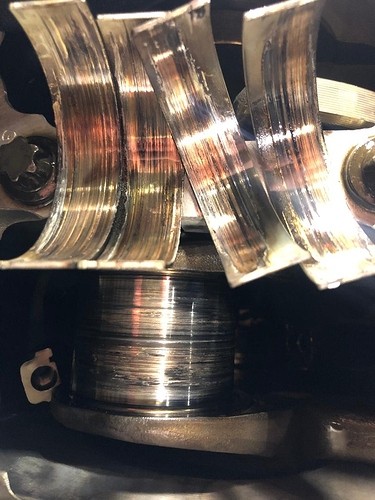Recently, we encountered a significant issue with an Rs5 Audi Engine, specifically a seized engine with 98,000 miles on the clock. Acquired in this condition, the vehicle is undergoing a comprehensive refresh, including the installation of a lower mileage transmission (25k) and engine (26k). During the teardown and inspection process, we gained valuable insights into the robust yet intricate nature of the RS5 Audi engine and the potential points of failure.
Initial diagnostics involved using a crank tool to attempt to turn the engine over. It was possible, but required considerable force with a 1/2″ drive breaker bar, indicating substantial internal resistance. A preliminary valve train check revealed no immediate issues, and encouragingly, the cam chain guides appeared to be in good condition for the mileage, seemingly improved compared to earlier Audi engine designs.
 Close-up of damaged rod journal from an RS5 Audi engine crankshaft, revealing bearing failure due to suspected oil contamination.
Close-up of damaged rod journal from an RS5 Audi engine crankshaft, revealing bearing failure due to suspected oil contamination.
The breakthrough came with the removal of the oil pan and lower assembly. Upon inspection, we discovered that the #4 crankshaft rod journal, responsible for housing the connecting rod big ends for cylinders #4 and #8, had suffered a spun bearing. The extent of damage and striations on the bearings strongly suggested oil contamination as the primary culprit.
Reviewing the vehicle’s service history, it was evident that maintenance had been consistently performed at Audi dealerships throughout its life. While this ensures adherence to Audi’s minimum specifications, it doesn’t guarantee the use of the highest quality oil or more frequent service intervals which, in hindsight, might have prevented this issue.
Disassembling the RS5 Audi engine further highlighted its complex engineering and construction. However, the findings lead us to believe that this particular engine failure was more likely attributed to oil contamination rather than an inherent design flaw within the engine itself.
This experience underscores the critical importance of regular and diligent maintenance, especially for high-performance engines like the RS5 Audi engine. Adhering to or even exceeding recommended oil change intervals, using top-tier quality oil, and ensuring regular air filter replacements are vital preventative measures. Furthermore, vigilance against any form of dirt or contaminant ingress into the engine is crucial for longevity and optimal performance. For RS5 Audi owners, this case serves as a potent reminder: proactive maintenance is the best defense against costly engine repairs.